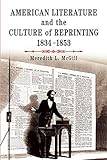American Literature and the Culture of Reprinting, 1834-1853 / Meredith L. McGill.
Material type: TextSeries: Material TextsPublisher: Philadelphia : University of Pennsylvania Press, [2013]Copyright date: ©2003Description: 1 online resource (376 p.) : 16 illusContent type:
TextSeries: Material TextsPublisher: Philadelphia : University of Pennsylvania Press, [2013]Copyright date: ©2003Description: 1 online resource (376 p.) : 16 illusContent type: - 9780812219951
- 9780812209747
- American literature -- 19th century -- History and criticism
- Authors and publishers -- United States -- History -- 19th century
- Collective bargaining -- Law and legislation -- United States
- Copyright -- United States -- History -- 19th century
- Literature publishing -- United States -- History -- 19th century
- American History
- LITERARY CRITICISM / Books & Reading
- American History
- American Studies
- Cultural Studies
- Library Science and Publishing
- Literature
- 344/.73/0189
- KF3372 .S9
- online - DeGruyter
| Item type | Current library | Call number | URL | Status | Notes | Barcode | |
|---|---|---|---|---|---|---|---|
 eBook
eBook
|
Biblioteca "Angelicum" Pont. Univ. S.Tommaso d'Aquino Nuvola online | online - DeGruyter (Browse shelf(Opens below)) | Online access | Not for loan (Accesso limitato) | Accesso per gli utenti autorizzati / Access for authorized users | (dgr)9780812209747 |
Frontmatter -- Contents -- Introduction: The Matter of the Text -- 1. Commerce, Print Culture, and the Authority of the State in American Copyright Law -- 2. International Copyright and the Political Economy of Print -- 3. Circulating Media: Charles Dickens, Reprinting, and the Dislocation of American Culture -- 4. Unauthorized Poe -- 5. Poe, Literary Nationalism, and Authorial Identity -- 6. Suspended Animation: Hawthorne and the Relocation of Narrative Authority -- Coda -- Notes -- Bibliography -- Index -- Acknowledgments
restricted access online access with authorization star
http://purl.org/coar/access_right/c_16ec
The antebellum period has long been identified with the belated emergence of a truly national literature. And yet, as Meredith L. McGill argues, a mass market for books in this period was built and sustained through what we would call rampant literary piracy: a national literature developed not despite but because of the systematic copying of foreign works. Restoring a political dimension to accounts of the economic grounds of antebellum literature, McGill unfolds the legal arguments and political struggles that produced an American "culture of reprinting" and held it in place for two crucial decades.In this culture of reprinting, the circulation of print outstripped authorial and editorial control. McGill examines the workings of literary culture within this market, shifting her gaze from first and authorized editions to reprints and piracies, from the form of the book to the intersection of book and periodical publishing, and from a national literature to an internally divided and transatlantic literary marketplace. Through readings of the work of Dickens, Poe, and Hawthorne, McGill seeks both to analyze how changes in the conditions of publication influenced literary form and to measure what was lost as literary markets became centralized and literary culture became stratified in the early 1850s. American Literature and the Culture of Reprinting, 1834-1853 delineates a distinctive literary culture that was regional in articulation and transnational in scope, while questioning the grounds of the startlingly recent but nonetheless powerful equation of the national interest with the extension of authors' rights.
Mode of access: Internet via World Wide Web.
In English.
Description based on online resource; title from PDF title page (publisher's Web site, viewed 08. Aug 2023)


